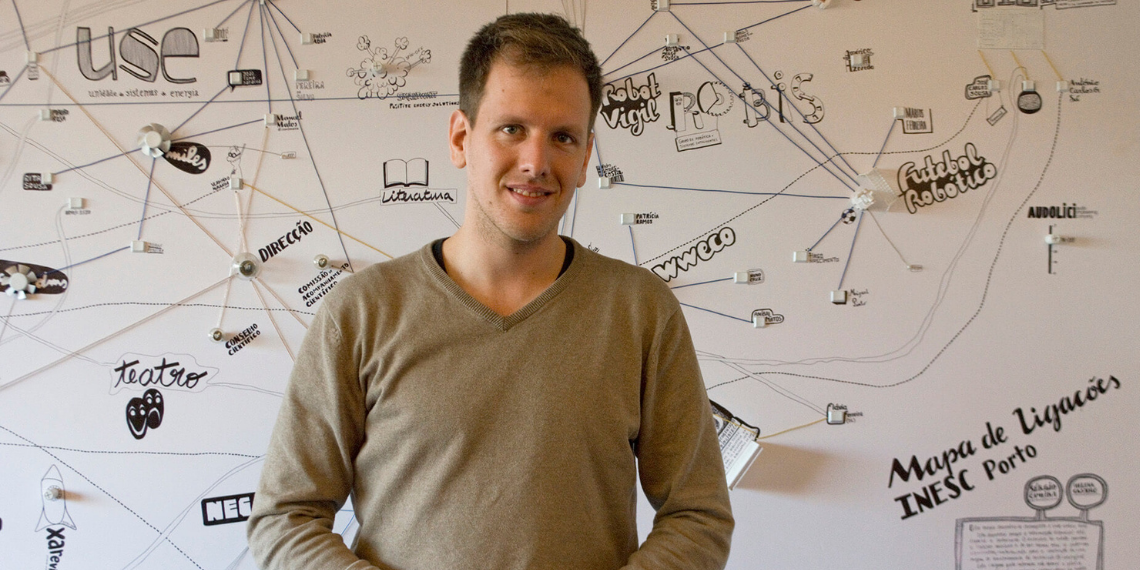Fabian Heymann, Digital Innovation Specialist (Swiss Federal Office of Energy)
- Years when you began working at INESC TEC and when you left: 2014 – 2019
- Centre at INESC TEC where you worked: Centre for Power and Energy Systems (CPES)
What have you been doing professionally since you left INESC TEC?
After leaving my position as research assistant at INESC TEC, in 2019, I worked with ENTSO-E, the European Network of Transmission System Operators – Electricity, as an Advisor in the System Development team.
Roughly one year later, I received a very interesting offer from the Swiss Federal Office of Energy (SFOE), where I now hold a position as Digital Innovation Specialist to the Energy Sector.
You have recently been awarded the EEX Award 2020. Tell us about it!
It is a European award, provided by the energy exchange company EEX, which awards a prize to “outstanding research contributions that address current challenges on political, regulatory, technical, or economic aspects in the fields of energy” every year.
The scientific paper resulted from a small project during my time at ENTSO-E, together with a student I supervised (Inès Harang) and another colleague that was working on a project about meteorological models applied to energy systems with ENTSO-E (Laurens Stoop). At the time, we started wondering how ENTSO-E’s widely recognised and well received studies on the security of supply in European electricity systems could be extended to the effects of climate change. We developed a case study that showed promising results – that is why we decided to share our ideas with the scientific community as a paper.
Let me explain that a bit more: in the awarded paper, we build a model on top of ENTSO-E’s study called “Mid-term adequacy forecast”, which, until today, does not consider any effects of climate change on the electricity supply-demand balance. I will give you an example: the electricity system is, for example, very sensitive to temperature changes. Under climate change, we expect to see an increase of extreme weather events over the next decades, such as droughts, hot waves or cold waves.
In the awarded paper, we showed how to model such changes using data from already existing climate change forecasts, which we project onto the “Mid-term adequacy forecast” of ENTSO-E. By projecting, I mean using data that shows us how the weather in Europe might look like in several decades, and fitting it into these large simulation models from ENTSO-E. That might sound simple, but instead, methodologically, it was a big leap forward.
Eventually, our work led to the reactivation of a European expert group at ENTSO-E that now takes the developed approach as a basis to further explore and include climate change effects in European electricity studies.
Well, congratulations!
Thank you very much! In a way, I would say it is a team effort, rather than Inés’, Laurens’ and my individual prize.
Since I have a quite interdisciplinary background, with brief contact with energy engineering initiatives, I found that I benefited a lot from my experience at INESC TEC, within the scope of this project. Here, I grew accustomed to work with colleagues from various expertise domains. I learned to change my outlook and to approach power systems from various angles – building the interdisciplinary foundations that I later used to integrate different subjects in the awarded article (climate science, data science, power systems).
When you think about INESC TEC, what comes to your mind?
Many memories I do not want to forget. First of all, I believe that this achievement would have been impossible without the excellent education and training I received from INESC TEC, from renowned academics such as Prof. Vladimiro Miranda, Prof. Manuel Matos, Prof. João Peças Lopes, Prof. José Saraiva, Prof. Nuno Fidalgo, Prof. Carlos Moreira – just to name a few, all of them outstanding, widely acknowledged scholars in Europe and beyond.
At this point, I would like extend my gratitude to all former colleagues from INESC TEC, researchers, students and staff, and especially to Dr. Filipe Joel Soares and Dr. Ricardo Bessa, for passing me a small dose of their ambition, curiosity and passion for science.
Finally, besides knowledge creation and scientific excellence, INESC TEC is also the right place to grow in social and cultural terms, with its international flair and outstanding welcoming culture.
Overall, I am extremely thankful for the opportunity to learn and work with all the above-mentioned and for the positive influence the years I’ve spent in Porto had in my life.




 News, current topics, curiosities and so much more about INESC TEC and its community!
News, current topics, curiosities and so much more about INESC TEC and its community!